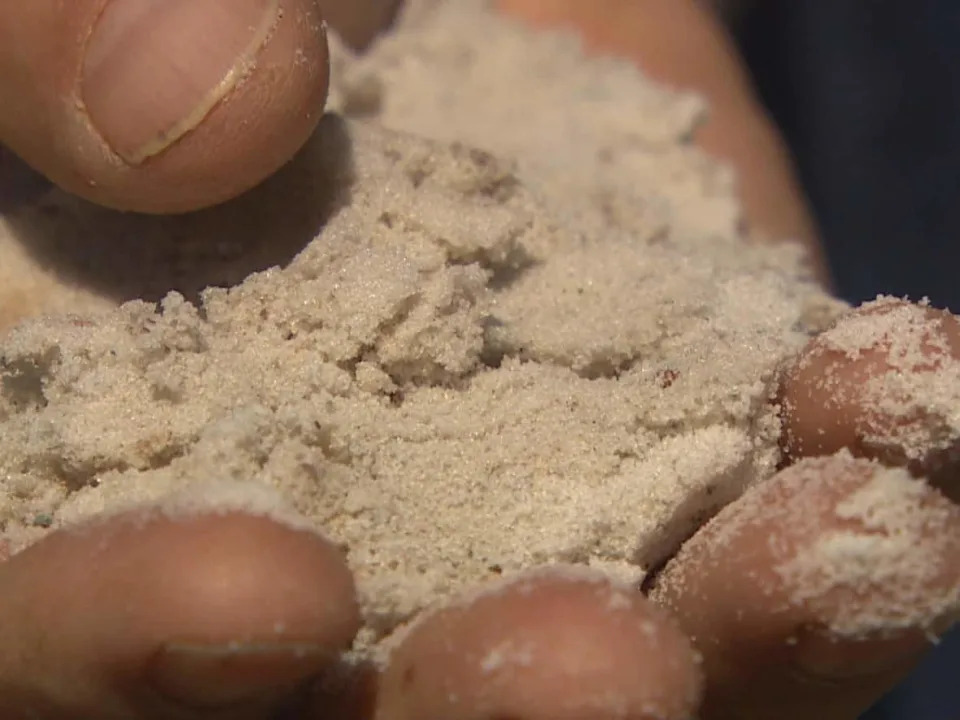CBC
Fri, February 16, 2024

Silica sand from a Sio Silica test well south of Vivian, Man. This mineral is sought for use in the production of solar panels, new batteries and semiconductors.
(Gary Solilak/CBC - image credit)
A proposal by Sio Silica to mine ultra-pure silica sand in southeastern Manitoba has been denied by the province, just two days after the NDP government approved a different silica mine near Lake Winnipeg.
The province has decided not to issue an environmental licence for the sand extraction project near Vivian, in the rural municipality of Springfield, Premier Wab Kinew and Environment and Climate Change Minister Tracy Schmidt announced Friday.
The decision was based on information and data provided by experts, including a report done by the Clean Environment Commission as well as consultation with impacted communities and First Nations, the province said in a news release.
The CEC report identified a number of serious environmental concerns about the project, which would have extracted sand through aquifers that provide drinking water to 100,000 Manitobans.
"This week our government said yes to CPS," Premier Wab Kinew said, referring to the Canadian Premium Sand silica project approved on Wednesday. "Today, we are saying no to Sio."
Standing at a podium with a sign on front saying "protect the water," Kinew made the announcement at the community club in Anola, east of Winnipeg, where residents erupted in cheers at the news.
At public hearings over the past year, many residents raised concerns that the project could impact the quality of the drinking water aquifer and that carcinogens could be produced if silica sand becomes airborne.
A proposal by Sio Silica to mine ultra-pure silica sand in southeastern Manitoba has been denied by the province, just two days after the NDP government approved a different silica mine near Lake Winnipeg.
The province has decided not to issue an environmental licence for the sand extraction project near Vivian, in the rural municipality of Springfield, Premier Wab Kinew and Environment and Climate Change Minister Tracy Schmidt announced Friday.
The decision was based on information and data provided by experts, including a report done by the Clean Environment Commission as well as consultation with impacted communities and First Nations, the province said in a news release.
The CEC report identified a number of serious environmental concerns about the project, which would have extracted sand through aquifers that provide drinking water to 100,000 Manitobans.
"This week our government said yes to CPS," Premier Wab Kinew said, referring to the Canadian Premium Sand silica project approved on Wednesday. "Today, we are saying no to Sio."
Standing at a podium with a sign on front saying "protect the water," Kinew made the announcement at the community club in Anola, east of Winnipeg, where residents erupted in cheers at the news.
At public hearings over the past year, many residents raised concerns that the project could impact the quality of the drinking water aquifer and that carcinogens could be produced if silica sand becomes airborne.
"Manitoba families can rest easy, knowing that your drinking water will stay pristine," Kinew said.
Calgary-based Sio Silica hoped to drill up to 7,700 wells south and east of Winnipeg over the next 24 years to get the sand, which is used in the production of solar panels, semiconductors and new batteries.
The company planned to inject air to bring up a mixture of water and sand from the water table, which extends under a large swath of southeastern Manitoba and serves eight municipalities.
The project proposed shipping 1.36 million tonnes of silica sand to green energy and technology markets annually over the lifetime of the mines.
In a statement, Sio Silica CEO Feisal Somji said his company is disappointed with the decision, "especially in light of the fact that Sio was advised that the province had no more questions."
Somji said Schmidt declined his requests for meetings and never shared any concerns her office or her department may have had with the proposal.
He also said his company was not provided with advance notice of the decision.
The province invited opponents of the proposal to its announcement.
'Unproven approach' to extraction: Kinew
Kinew said Sio Silica proposed using a new method of extraction.
"With this unproven approach, we cannot guarantee the safety of drinking water for future generations in this part of Manitoba," the premier said at Friday's announcement.
"I want to be very clear: We are prepared to develop mining opportunities here in Manitoba, but it has to be done in the right way … that minimizes the risk to the health of humans and the safety of the environment. We can do both.
"The business case of this project does not outweigh the serious environmental risk this project poses."
But Somji argues the rejection was a unilateral decision "based on Minister Schmidt's opinion of the environmental concerns, and not based on feedback from the Environmental Approvals Branch, who had oversight and review of this application."
He said a draft licence presented to Sio Silica in September 2023 called for Sio to conduct testing, "rigourous data collection and a final report on findings" before commercial extraction.
The draft licence "was known to the current NDP government," and the approach would have allowed Sio to "address any remaining environmental and technical concerns," he said.
Somji also said the province has now effectively killed a proposal by German company RCT to develop a solar-panel manufacturing facility that would have relied on Sio Silica's product.
Schmidt said graduated licensing was not considered because of the potential risks to the environment.
Environmental groups called the decision to reject the licence "an important victory for safe drinking water, for science and for common sense."
"We commend Manitoba for listening to the community and to the scientific evidence," Tangi Bell of Our Line in the Sand, a group of concerned citizens opposed to the mine, said in a news release.
Her group and the Manitoba Eco Network raised concerns about the project after it was first announced in 2020 and spoke against it during the Clean Environment Commission hearing last year.
"This project never made sense for the region or for Manitoba," Glen Koroluk, Manitoba Eco-Network executive director, said in the release. "Today's announcement confirms the importance of evidence-based decision-making."
Open to reviewing future proposals: minister
Schmidt said at the news conference Friday that the government realizes silica is a valuable resource and would be open to working with experts and environmentalists to review any future proposals for the area around Vivian.
"We would certainly never rule out projects in the future, but this project, this proponent this time is a no," she said. "There are simply too many unknowns, and the risk at stake is simply too great."
On Wednesday, Kinew and Schmidt gave the go-ahead to Canadian Premium Sand, another Calgary-based company, to mine silica in Hollow Water First Nation, east of Lake Winnipeg, and create a solar glass production facility in Selkirk.
The mining and production facility are expected to bring in $2 billion in provincial taxes over a decade, or $200 million annually, and create hundreds of jobs.
CPS pursued the project for several years and received licensing approvals in 2019 and 2023, but faced delays and criticism over potential risks.
The NDP government did "months of careful review" of the CPS environmental licence, walking through every detail, and is confident that project is safe and environmentally responsible, Schmidt said Wednesday.
Comparing it to the Sio proposal, she said on Friday that "the two projects could not be more different. The only similarity is the resource being mined."
WATCH | Environment minister on how projects differ:
The CPS project employs more traditional open-pit mining methods with no requirement to dig through aquifers. Sio's method, where thousands of wells would be drilled through two aquifers to extract the sand, has never been done anywhere in the world, Schmidt said.
"There were many, many questions and unknowns raised by this project," she said.
"No one knows what the long-term effects of this proposal would be and frankly, the worst-case scenarios would be absolutely devastating, as more than 100,000 Manitobans source their drinking water from these aquifers."
'This is a jubilation': resident
Georgina and Joshua Mustard, who live next door to where the processing plant was set to be built, said they can rest easier with their worries lifted.
"This is a jubilation. I'm glad it's over, you know, for now," Joshua said. "Very happy, very happy."
Georgina described the uncertainty over the past few years as "pretty rough," before pausing as her eyes pooled with tears.

Jeff Stapleton/CBC
"A lot of sleepless nights wondering what our future looks like for our kids. But I'm glad it's all over now and everything's gonna be OK," she said.
"The roots that we have planted are gonna be there for us and our kids and our grandkids."
While the NDP government has shut the door on Sio Silica's proposal, Kinew said Manitoba's ethics commissioner will continue to examine claims made by him and two former PC cabinet ministers that the outgoing government attempted to approve the mining proposal following the election, which the Tories lost.
Interim Progressive Conservative Leader Wayne Ewasko declined to comment on that investigation.
Like Somji, he said he found it interesting Schmidt and Kinew announced the rejection — a decision he said should have been made by experts.
Somji said his company "remains hopeful that the government will be open to discussing solutions that are grounded in science and do not squander this multi-generational opportunity for the people of Manitoba."
"In the meantime, Sio will take the coming weeks to evaluate its legal options in the face of the minister's decision today," he said.
No comments:
Post a Comment